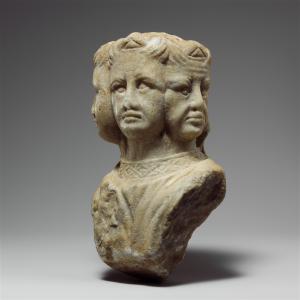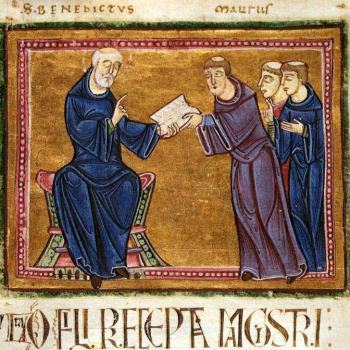
Sometimes, we can get so caught up in our thoughts or desires, we are not aware of what is going around us. This can and often will put us in danger. For example, if we are crossing the road, lost in our thoughts, we might not be as observant as we should be of the road conditions. A car could be driving erratically, and if someone does not intervene, we might be hit or killed by the car before we knew what was going on. Similarly, we can find ourselves so caught up in worship, so caught up in religious piety, we lose sight of our basic needs. We might think that God would take care of us and protect us from harm. While it is true that God has the power to do for us what we do not do ourselves, this is not what God wants from us. God does not want us to test our faith, nor to be put to the test, by ignoring the dictates of prudence. God gave us freedom, and that means, God allows us to experience the consequences of our actions. We should not tempt the Lord (cf. Lk. 4:12), especially if that temptation comes out of some haughty spirit which suggests we should expect God to take care of our every needs when, in reality, God has established it that we are the ones who should normally do that.
When we think God will make it so that we can ignore our own responsibility to ourselves (or others), or when we think God will protect us so that we won’t have to worry about our needs or the needs of others (as many have done during the COVID19 pandemic), we show presumption and pride, not faith. We should know this is not how God wants us to act. Indeed, God has warned us we risk grave consequences if we do so: “The haughty looks of man shall be brought low, and the pride of men shall be humbled; and the LORD alone will be exalted in that day” (Isa. 2:11 RSV).
We can see the truth of this in a story associated with Abba Siseos. He wanted to find a way to have an all-night vigil without falling asleep. There was a good intention involved, but what he did ignored basic prudence:
One of the Fathers related of Abba Sisoes of Calamon that wishing to overcome sleep one day, he hung himself over the precipice of Petra. An angel came to take him down and ordered him not to do that again and not to transmit such teaching to others. [1]
While he was a holy man, not everything Sisoes did was filled with wisdom. In this instance, it is clear that he was not thinking properly. Possibly, this is because he did not get sufficient amount of sleep, for lack of sleep often affects how we think. He was tired, but he wanted to worship God, and to worship God all night without falling back to sleep. So what he did was put himself in undue danger, thinking that by hanging over a precipice, he would wake up every time he started dozing off due the shock he would feel by almost falling over the precipice. The thing is, when one lacks sleep, eventually nothing will stop them from falling asleep. Sisoes would have eventually died if he had not been stopped from putting himself into such a dangerous situation. Did he do this out of pride? Certainly, he thought he could handle the danger, and so in the midst of his imprudence, pride was likely a part of it. He thought he was doing good by finding a way to overcome the limitations of his human frailty, but in reality, it was not good, because not only would it not work, he would eventually have experienced his own premature death.
Truly, Siseos deceived himself. He sought after some good, but with the wrong means, and possibly with the wrong intention (such as vainglory). We, also, often find ourselves deceived in a similar fashion. We look to some good which we want to do, often with a bad desire, and the desire takes us over, making us not think straight, so we end up ignoring basic precautions. This is where reason can and should influence us and help us put our desires in check. We need to be prudent in our actions. We need to realize our human frailty and make sure our actions take our weaknesses into account. We must do so, not only for ourselves, but for others, making sure our actions take our neighbor’s needs into consideration so that we do not put them needlessly at risk. Indeed, we must promote the needs of others over our own private inclinations . “Do nothing from selfishness or conceit, but in humility count others better than yourselves. Let each of you look not only to his own interests, but also to the interests of others” (Philip. 2:3-4 RSV).
If we want to worship God with truth and love, we will love our neighbor. We will follow the dictates of prudence and make sure our actions do not cause them undue danger or harm. God is more pleased when we do this than when we try to show off our piety through grandiose gestures. “Bear one another’s burdens, and so fulfil the law of Christ. For if any one thinks he is something, when he is nothing, he deceives himself” (Gal. 6:2-3 RSV). We might not find ourselves trying to perform superhuman feasts as Sisoes did, but if we ignore prudence, if we ignore the needs of our neighbor, if we put them at risk, we are worse than Sisoes, for he only put himself at risk.
We must not ignore the virtue of prudence in our spiritual life. We must not be haughty and assume God will take care of us if we do not take care of ourselves. We must do our part. We must cooperate with grace if we want grace to perfect us. We must cooperate with God and act with prudence if we want God to help us in our time of need. If we assume God will act when we do not do what we can, we will often find we do not receive what we expect from God. And then what will become of us and our faith? Will we lose faith because we did not get what we wanted, thinking we should have done so? Or will we be like Sisoes, who, once he learned he was doing wrong, did not object to what he had been told, but rather listened to the wisdom he has been given and made sure he did not act in such a way again?
[1] The Sayings of the Desert Fathers. trans. Benedicta Ward (Kalamazoo, MI: Cistercian Publications, 1984), 219 [Saying of Sisoes 33].
Stay in touch! Like A Little Bit of Nothing on Facebook.
If you liked what you read, please consider sharing it with your friends and family!
















